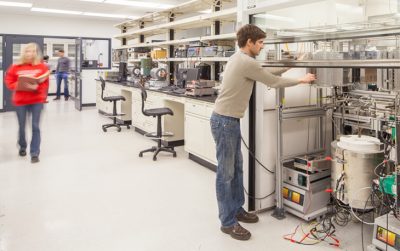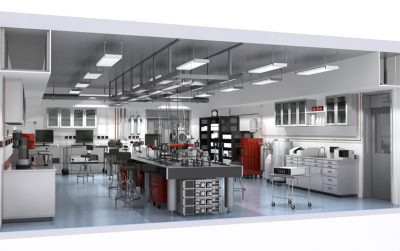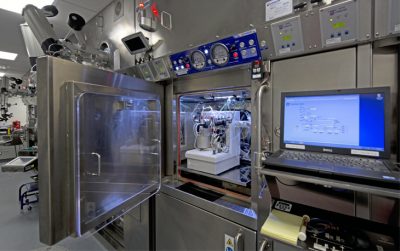The art of science
The innovative work accomplished by our major institutional and corporate clients in their laboratories and research facilities forms the cornerstone of our new knowledge-based economy. From advanced medical research and basic research across all the scientific disciplines to applied research and development, there is a strong demand for knowledgeable, skilled and collaborative design professionals to deliver the facilities required to accommodate this important work.
To support this need, MCA’s laboratory design professionals create science education, science research, applied science and research & development environments that are designed to promote successful results – technologically appropriate, flexible and frequently cross-disciplinary in nature – while mindfully addressing the health, safety and wellbeing of the people that use them.
MCA has worked in science & research related facilities across many of our client sectors, from advanced academic science teaching and research facilities to medical research facilities for some of the country’s leading institutions, and from medical center testing laboratories to Fortune 500 corporate research & development facilities working in wide-ranging fields from electronic defense systems to consumer products.
Science + Research
Science teaching facilities are reflecting the current approaches seen in the scientific research and development industry incorporating collaborative multi-disciplinary programs into the facility design to support this paradigm. Increasingly, these programs have also been incorporating both dedicated faculty and student research facilities, beginning at the undergraduate level. MCA science teaching facilities have for many years successfully promoted this collaborative approach to teaching in the sciences. MCA projects have incorporated evidence-based design principles and recommendations promoted by the Association of American Colleges & Universities Project Kaleidoscope (PKAL), including requesting and participating in a project-specific Keck consultancy provided by one of the participating Higher Education institutions.
At MCA we are continually finding ways to make building sustainability relevant to STEM programs. By incorporating concepts such as alternative energy generation and water reuse features into the building infrastructure and making these features accessible to the instructional program the building itself becomes a demonstration laboratory.
MCA’s academic clients are engaged in wide-ranging research endeavors requiring specialized facility design. A representative sample of our client’s and the research facility typologies in which we engage include:
• University of Maryland College Park, College of Engineering – Energy Research Laboratory
• University of Maryland Schools of Medicine, Nursing, Pharmacy & Dentistry: long-term, consecutive IDIQ contracts through the University of Maryland for the planning and design of academic medical research facilities
• Johns Hopkins University Department of Psychology & Brain Sciences – The Laboratory for Child Development
• Institute for Bioscience and Biotechnology Research (IBBR): Master planning and design services for a collaborative research partnership between the University of Maryland, and the National Institutes of Science & Technology (NIST)
• Johns Hopkins Applied Physics Laboratory: multi-year open-end contract with a major, multi-disciplinary University Affiliated Research Center (UARC) organization engaged in a multi-disciplinary research mission
• Chemistry and Biochemistry, Physics, Engineering & Robotics, Psychology & Neuroscience and interdisciplinary iterations of the above, such as the innovative BioGeoChemistry Research Laboratory for Towson University

Energy Research Laboratory – UMD
MCA has provided planning, design, and design management services for multiple federal agencies and organizations engaged in research & development, including:
Defense Related Research + Development
• Department of the Army (example: Aberdeen Proving Grounds)
• Department of the Navy (example: Naval Research Laboratory)
• MDIA, Air Force
Civilian Federal Agencies
• National Institutes of Health (NIH)
• United States Geological Survey (USGS)
• National Institutes for Science & Technology (NIST)
MCA has provided services for academic public sector projects designed and constructed under the auspices of federally-funded research grants in conformance with their applicable requirements, through organizations including:
• National Science Foundation
• National Academy of Sciences

Naval Research Laboratory
MCA has enjoyed collaborating with Schools of Medicine and Federal Agencies in the design of facilities supporting their medical & bio-medical research programs. Through these collaborations we’ve developed long term relationships, often working under IDIQ contracts, and so creating a portfolio of experience in specialized medical research that is both broad and deep.
We appreciate the opportunities to engage with such esteemed institutions as the Johns Hopkins School of Medicine, the University Of Maryland School Of Medicine and the National Institutes of Health.

Positron Laboratory – Johns Hopkins Hospital
For several decades, MCA has supported global private enterprise leaders in their product and systems research & development. Several of these clients constitute long term relationships working on a large number of task orders. Representative clients include:
• Northrop Grumman Corporation: Defense Research + Development
• Coty, Inc. & P&G Corporation: Cosmetics & Fragrance Products Research, Development + Manufacturing
• Quest International (A Division of Unilever): Flavors Research & Development
• Stanley Black & Decker: Power Tools and technology-based Fastening Systems
Laboratory facilities are some of the largest consumers of energy for our clients! The need to support “once-through” air, space conditioning, pressurization controls and the power burden of 24/7 operation to run critical equipment and building systems results in significant energy consumption. MCA has successfully brought creative thinking to the problem.
MCA is a Corporate Supporter of the US DOE & EPA Labs 21 initiative for sustainable laboratory facilities, which seeks to educate and provide tools for a sustainable and low energy approach to designing, constructing and maintaining laboratory facilities. In addition, several of our laboratory projects have achieved LEED Certification up to and including LEED Platinum.
To accommodate our clients’ needs for flexible and adaptable laboratories, accounting for furniture and equipment in each research facility can be a daunting task. In addition to fixed equipment, laboratories often require the use of shared moveable equipment, so establishing an inventory of FF&E early in the design process allows for better coordination of support services throughout a facility. MCA knows the importance of this data and has developed a proprietary spreadsheet to facilitate this process. We can account for the design parameters of each piece of equipment in terms of size, weight, utility requirements, noise and vibration technical parameters, maintenance access, and safety requirements.
From bio-containment to radiation exposure, and from perchloric acid hood exhaust design to proper chemical storage, the potential hazards to be obviated in scientific & research pursuits are almost as numerous as the fields themselves. The need to design facilities that protect both the user and the building or community context in which they work is paramount. This means creating a safe day-to-day working environment, while accommodating those special cases where conditions are highly flexible and changing.
Safety begins with acknowledgment of safety as a top priority, a knowledgeable understanding of the processes at work within the facility, and the adherence to established good practices codified in national and industry standards and procedures. It ends with verifying that the work is designed, completed and commissioned as required to ensure that good practices have been adhered to, and are understood by the user and their operations and maintenance support team.
MCA is committed to designing safe research facilities and as design professionals, and we will not sign-off on a project until we determine that it is in conformance with appropriate safety protocols.
PROJECT PROFILES

Ready to Work on Your Next Science + Research Project?
Contact Ed Gillikin, egillikin@mca.design
View Ed's Bio













